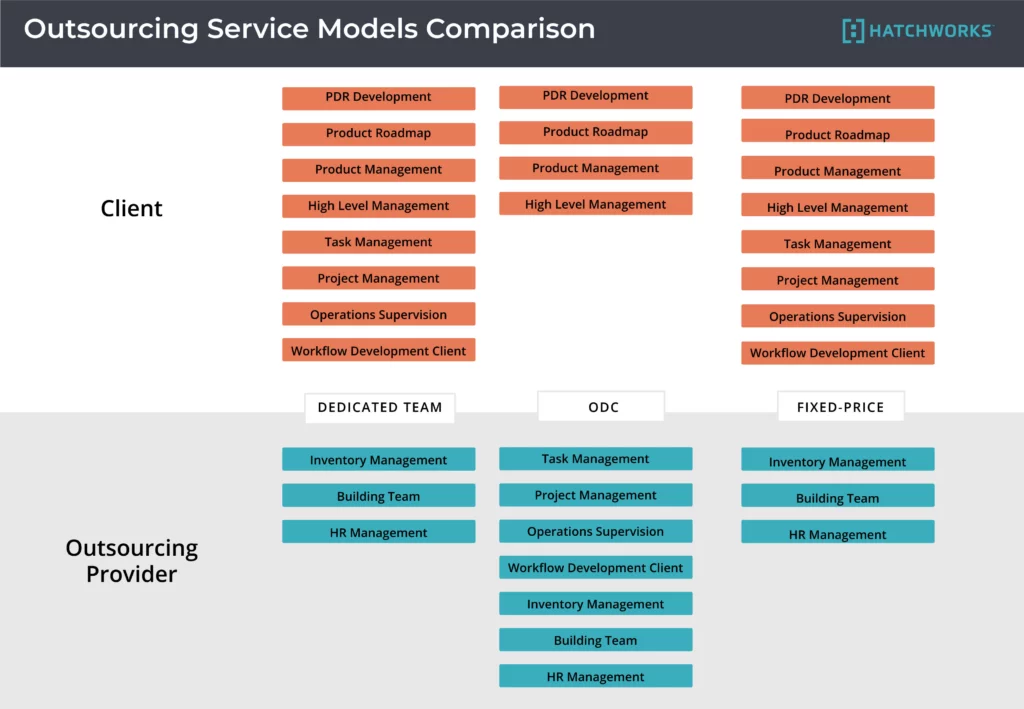Outsourced Development Teams have proven to be a secret strategy for companies looking to accelerate software development and more importantly accelerate time to value.
Time to value is defined as the time it takes for your customer to start deriving value from your digital solution.
This is VERY important.
The right outsourced development team can act as a true partner helping make sure what you are building is desirable by your customers and viable for your business.

What is an outsourced development team?
An outsourced development team is a team external to your own provided by a 3rd party partner focused on providing software development services. There are several models of outsourced development teams, but typically the outsourced development team is focused on delivering a specific software development solution.Why outsourced development teams are more important now than ever before
With an impending recession, outsourcing software development can be a critical part of your strategy.
Software application development services still remain the most outsourced IT function with 60% of US businesses planning to outsource at least part of their development.
Even with a recession upon us, the global software application outsourcing market is projected at $116B in 2022 and is expected to reach $145.7B by 2027. That is a 4.7% growth rate.
So why are companies continuing to look to outsourced development teams even with a recession imminent?
They reduce costs and operating expenses
This one is obvious but worth noting. When working with an outsourced development team, you are not responsible for the typical expenses you would incur when hiring a full-time employee such as healthcare, insurance, taxes, training, etc.
Outsourced development teams offer flexible velocity
A major benefit of an outsourced development team is the ability to ramp up quickly and start delivering compared to the relative time it would take you to hire an internal team. Not to mention the time it takes for an Agile team to start gelling and working well together.
Outsourced development teams typically have worked on other projects together and bring experience and the attributes of a high-functioning team.
The other component of that is the flexibility to scale the teams up or down based on your project needs, economic situation, competitive landscape, business strategy, etc.
The alternative of “scaling down” an internal team is no fun and is an easy way to harm morale and culture.
They provide deep talent and expertise
Outsourced development teams allow you to tap into top talent, and depending on the partner you are working with, you can tap into a global talent pool.
Trying to build your own presence in another country is no small task. Outsourced development partners allow you to take advantage of these global talent pools without the headache of operating your business in other regions of the world.
While top talent is always important, domain-specific expertise is sometimes overlooked. This can include domain expertise related to your technology, industry, and approach to software development.
The best outsourced teams provide accountability
Last, but probably the most important factor is accountability. If you are working with the right partner, they will make accountability easy by leveraging Agile principles and providing consistent updates on the progress of your project.
The one constant in software development is change. A good partner will keep you in the loop as your needs, customer needs, scope, and the market evolve.
The types of outsourced development teams
Having a successful engagement with an outsourced development team is highly dependent on selecting the right model based on your company and the type of project you are looking to deliver.
There are 3 main models to consider when working with an outsourced development team.
Integrated teams
Integrated teams are best when you are looking to fill gaps within your existing development team. Your internal team works alongside your partner’s software developers to form a cohesive team.
You are typically required to provide direction for your partner’s engineers and own the project’s outcome. Contracts are often structured in a time and materials or fixed monthly cost per team member.
Dedicated teams
Dedicated teams provide you with a turn-key, well-oiled, development machine.
You benefit from your partner’s experience delivering projects as a team, thereby providing built-in velocity from the very start of your project.
The concept of bringing work to teams is a hallmark of creating a zen-like Agile development team.
The team is selected based on your unique project requirements with the major benefit being the turn-key nature of a dedicated software development team. You can go from 0-60 without requiring the need to bring any of your own resources to the plate, or more importantly disrupt your key resources from other critical projects.
These contracts are typically structured in a fixed monthly price for the entire team making budgeting for your project easy.
This model gives you the flexibility you need to build great software. You have control over the scope of your project as it evolves vs the alternative of incurring change requests from your partner every time a requirement changes.
At HatchWorks, we favor this approach because it is built for you, the customer. Check out our approach.
Fixed-price outcome based
The last model is a slight tweak on the dedicated team model.
Instead of paying a fixed monthly price for the capacity of the team, you are paying for the outcome your partner will deliver or the delivery of predefined scope.
This model gives you the least amount of oversight on the project as your partner is working as an autonomous team to deliver the against the agreed upon outcome.
While this model can be a win-win for both you and your partner, it is important you both have a clear understanding of the scope and the defined outcomes you are looking to achieve.

What about the location of my outsourced development team?
Location is one of the most important considerations when selecting an outsourced development team, but not in the way you may think.
It is no longer vital to be physically collocated with your partner. Many teams are working remotely and have proven to do so successfully.
What is most important is being aligned by timezone so you can share the day’s work.
Nearshore presents the best option for US companies providing you with the right team at the right value for today’s remote world.
For more on nearshore software development, check out our guide.
How to manage and work with an outsourced development team
This is largely dependent on the type of outsourced development team model you are working within. However, in any case, you should be taking an Agile approach.
If your partner is not skilled in Agile, you may want to search for a new partner, because building great software requires it.
As the main stakeholder, you should be involved in some of the Agile ceremonies acting as a feedback loop for the team.
In an integrated team, your partner will be involved in all the ceremonies along with your team.
In a dedicated team or a fixed-price outcome-based approach, you may just be involved in the below major sprint ceremonies:
Sprint planning
In sprint planning, the team determines the items that will be added to the next spring backlog to be worked. It is important you are up to speed and provide perspective when necessary about what is the highest priority.
Sprint review/demo
This is the most critical and often most exciting meeting for you to attend. This is where you get to see the working software being delivered after each sprint. It allows you to create feedback on what is being delivered, and stay up to speed on the progress of the project.
Note: if your partner is not delivering working code on a regular basis, you may have a bigger problem worth diagnosing.
Client partner sync
This meeting can be by different names, but it is critical to have a meeting with your partner on a regular basis outside of the sprint ceremonies. This allows you time to level set with your partner on status, risks, assumptions, and any changes in your project.
A good partner will always bring up any risks, issues, or blockers proactively so they do not fester and become bigger issues.
How to get started with an outsourced development team
Figuring out where to start can be scary.
There are literally thousands of partners out there, many positioning the same way. So how do you vet who to work with and get to a short list? Here are a few tactics to help with finding the right partner.
Ask your friends and colleagues
Asking your friends and colleagues about partners they have worked with before and had success with is a great starting point. This is typically the most unbiased and loyal perspective you will get.
Review listing services
There are several listing services out there that can help you identify top partners to work with within the area you are focused on. Clutch, DesignRush, G2, The Manifest, and GoodFirms are great starting points when looking to create an initial list of partners to talk with. These listing services will have reviews and many times past work examples so you can do your own research first.
Now that you have made a short list, how do you make your decision? Here are the main things you need to consider when making your decision.
Where do they operate?
Where your partner operates and has development hubs is an important consideration. Now that most teams are remote in some form or fashion, being physically collocated is no longer a significant consideration. See if your partner has development hubs in other countries allowing you to take advantage of a wider pool of talent and a better return for your investment. If you are a US firm, a partner with a presence in Latin America is critical.
Operating model
We hit the different operating models earlier, but it is important to be aligned on how your preference for delivery and how your partner delivers. Ensure you are on the same page, and they can deliver in a way you are comfortable with.
Domain expertise
This is critical in shortening time to value. A partner that has domain expertise in your industry, way of working, or other disciplines means that can deliver quicker with better quality as it will take them a shorter amount of time to get up to speed.
Work examples and references
Make sure to ask for past work examples, especially those in your industry. This will give you a good barometer check to see if they have delivered similar solutions in the past. Reviews and references from past customers are also a great way to see what other clients say about the partner you are vetting.
How quickly they can get started
One sometimes overlooked consideration is how quickly can your partner get started. Most partners in today’s talent shortage don’t always have a ready-and-waiting bench ready to start on your project.
It is important to know this early in your discussions with your prospective partner. Look for a partner that has a well-defined and structured recruitment process that can build the right team in as short a time as possible so you can get started.
Culture and retention
Last, and probably one of the most important factors is the culture and retention rates of your partner. (PS. these are related). A partner with a strong culture will be able to better retain their people and create an environment where team members go the extra mile to deliver for their clients.
The last thing you want is a revolving door of talent from your outsourcing partner because domain and solution expertise will go out the door with them. This causes unnecessary delays in delivering the right software solution.
Summary
Finding the right outsourcing software development partner is not easy, but the right partner can be worth its weight in gold.
If you are in the market for a software development partner, let us know.
HatchWorks can help you build the right digital product, the right way through our integrated US and nearshore Agile teams. Whether you are starting from scratch or modernizing a legacy solution, we can help you create a software solution that delivers real business value.
We’re ready to support your project!
Instantly access the power of AI with our AI Engineering Teams.



